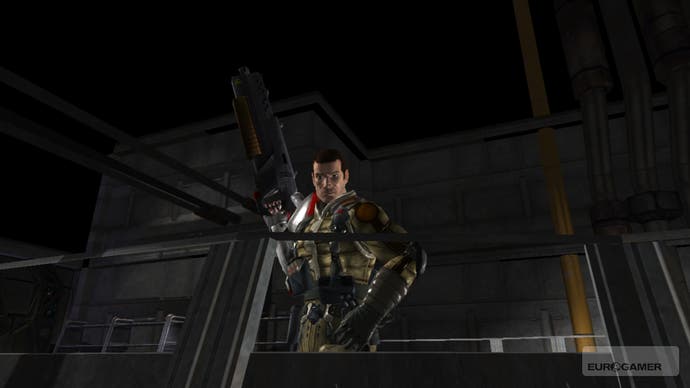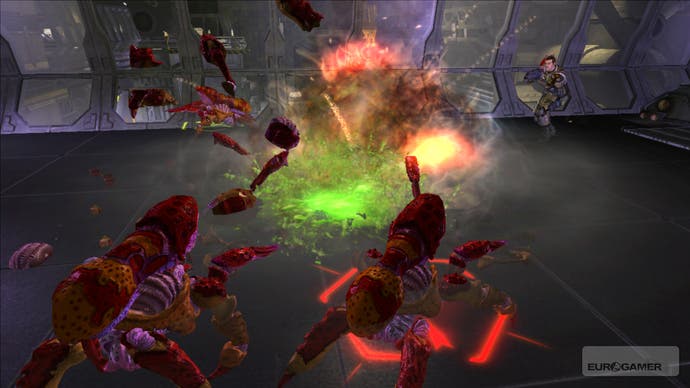Space Siege
Taking the crawler out of the dungeon.
It's not the most optimistic vision of the future we've ever heard, but the back-story to Space Siege runs something like this - in the far future, humanity ends up getting its backside soundly kicked by the insect-like leg of a superior alien race. So soundly kicked, in fact, that at the start of them game they destroy the Earth, and manage to attach a pod full of teeming masses of over-evolved-cockroach baddies to the vast ship on which you're escaping, the Armstrong.
Mankind's only hope, the ship's AI determines, is to undergo upgrading with cybernetic parts and components, making them into a match for the aliens in battle. Unwilling to permit the upgrading of the entire race, you volunteer to become a cyborg and fight off the alien menace. If you could imagine some dramatic music hitting a crescendo right about now, that would be lovely.
What kind of game are you envisioning, based on that story? A balls-out, brains-disengaged first person shooter, perhaps, designed by a team whose entire gaming philosophy is fuelled by marathon Halo sessions and crates of Jolt Cola?
Wrong. In fact, it's the back story to the new action RPG game from Gas Powered Games, best known for its previous ARPG title, Dungeon Siege. Fresh from developing real-time strategy love-fest Supreme Commander, Gas Powered and its charismatic boss, Chris Taylor, are dragging the Siege series into a science fiction setting - and taking the opportunity to rewrite the rule-book in the process.
Lights, Camera, Action RPG

The move to a science fiction environment - complete with shiny energy weapons, cyborg upgrades and the huge, mechanical environments of the Armstrong - is perhaps the most blatant change to the standard ARPG formula in Space Siege. After Dungeon Siege 2, Taylor says, the team was "full up on fantasy"; which is not to say that they don't like the genre, or appreciate its popularity, but simply that they wanted to do something different this time.
Space Siege, then, is less like Lord of the Rings and more like Aliens - indeed, the whole feel of the game is that of an action movie. Lead character Seth Walker is a quintessential action hero, a warrior who sets out to save humanity from an alien menace... And unlike Dungeon Siege's characters, Walker will be doing all his saviour stuff alone.
This, to some extent, is an even bigger departure than the move to a science fiction environment. Space Siege is a single-character action RPG, a complete reversal of Gas Powered's multi-character approach to Dungeon Siege - which, at the time, was considered to be one of the most unusual and innovative aspects of the series.
Having experimented with multiple characters, Gas Powered has now come full circle. Seth Walker is your sole avatar in the game - and unlike Dungeon Siege's somewhat dull, blank slate type characters, he's got a personality, a history and a voice of his own. Dungeon Siege, Taylor explains, worked on the principle that players would "imprint" their own personality on a blank slate - a concept that works better on a whiteboard in a developer's office than it does in a real game, he now believes.

As you - or rather, Walker - explore the Armstrong, you'll get the opportunity to upgrade yourself using cybernetic parts you pick up along the way. The effects are obvious; the more you upgrade, the less human your character looks, as he gradually transforms into an arse-kicking robot death-monger. As character progression goes, it's a hell of a lot more blatant than a +2 modifier on your dexterity.
This, however, is one of the basic conflicts of the game; Walker himself is unhappy with the idea of losing his humanity as a result of the cybernetic implants, and this extends rather further than some wishy-washy dialogue where he agonises over whether to install the latest cool gun on the menu. Throughout the game, you maintain a "humanity score" - a meter of how much of your body is still good old-fashion homo sapiens. Tool yourself up totally, and the game will be pretty easy to finish; but try and do it with less cyborg bits and bobs, and you'll uncover a different - and tougher - play experience, not to mention a different game ending.





.png?width=291&height=164&fit=crop&quality=80&format=jpg&auto=webp)



